
Sample Worksheet Image 1
Each lesson comes with about 10 pages of bespoke copyright study notes, all prepared by Abu Khadeejah, may Allah bless the work and effort. That’s thousands of pages over the period of the course. Here are a few samples of the first pages:
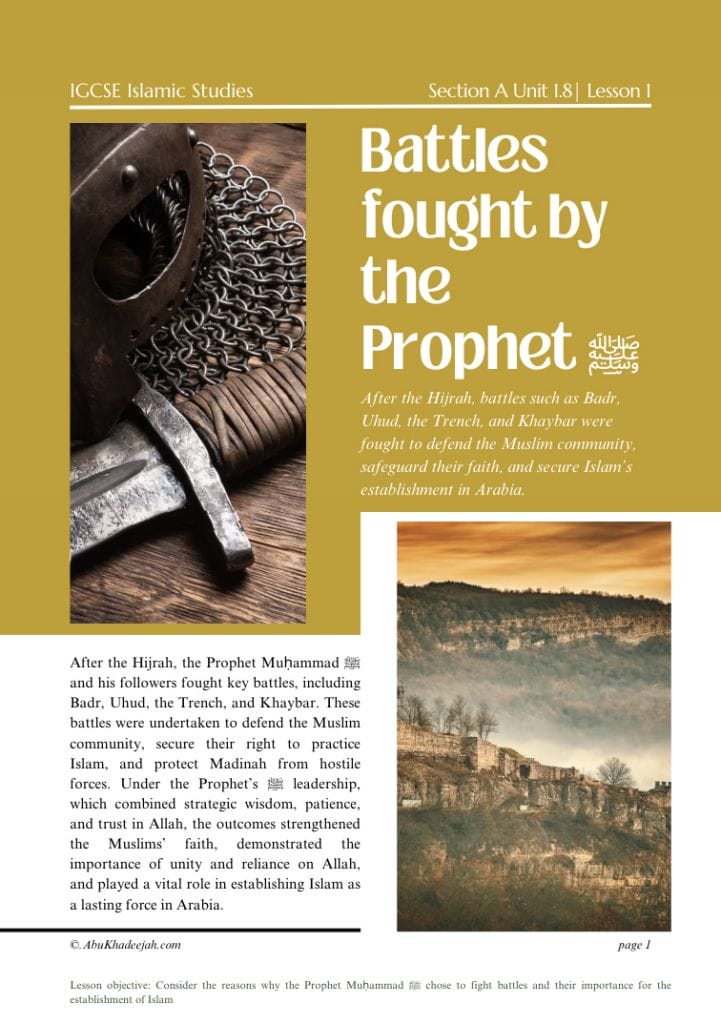

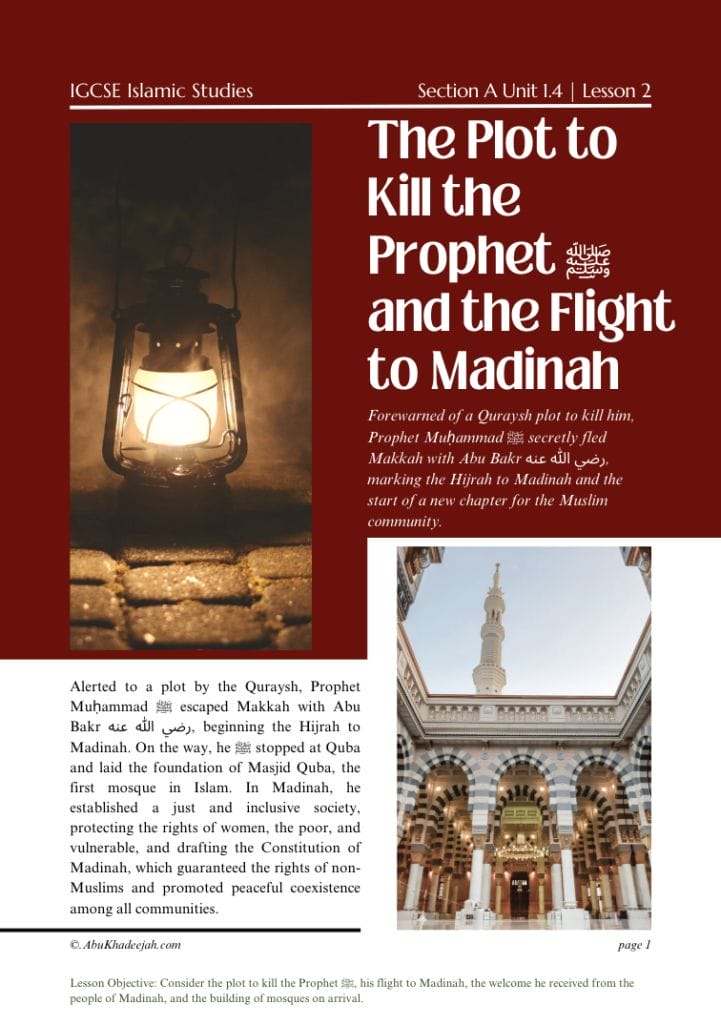
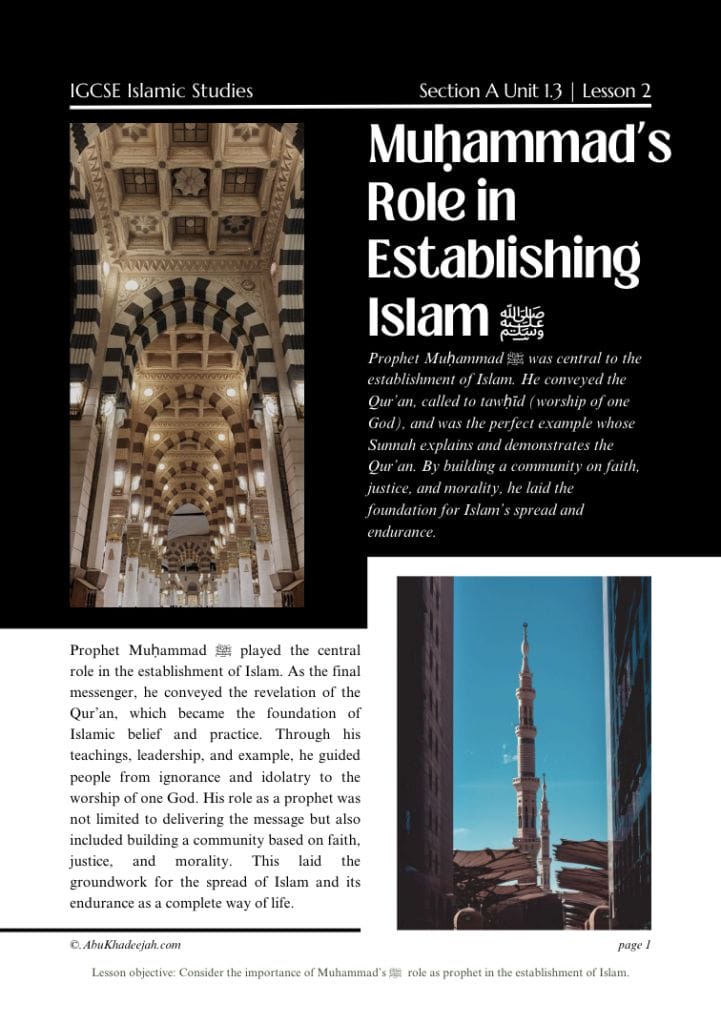
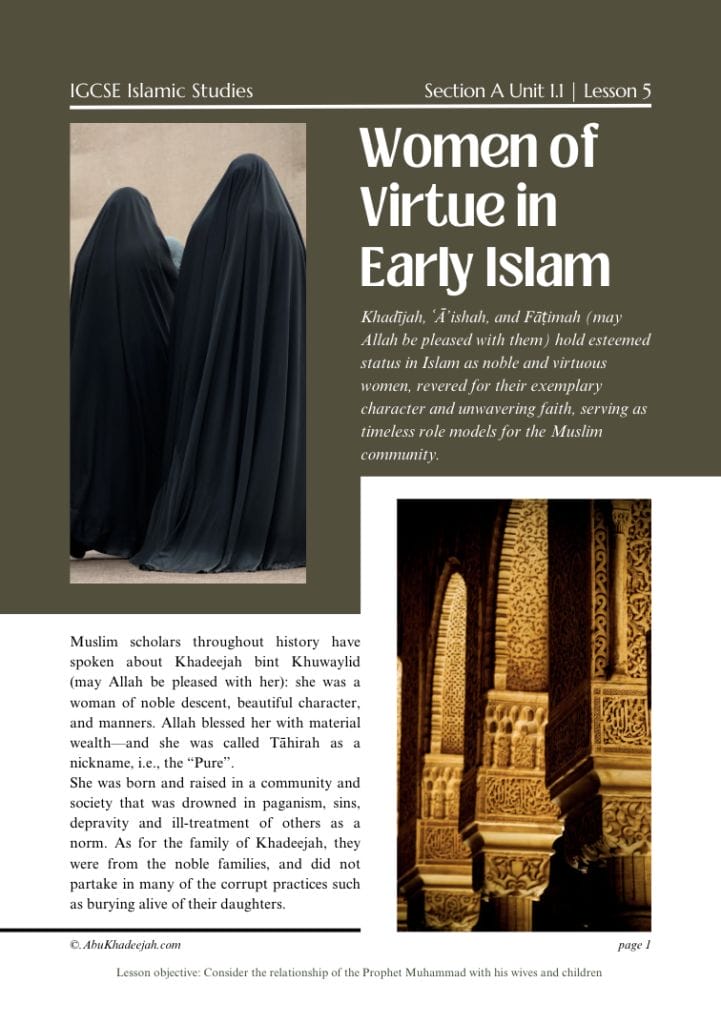
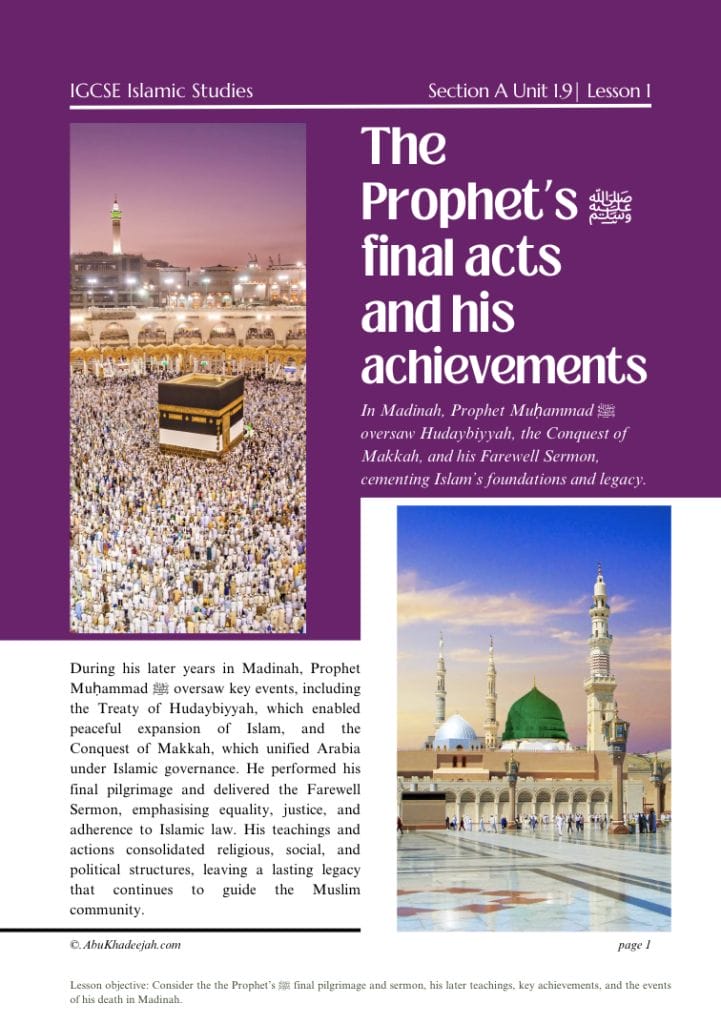
1. Islamic Studies: International General Certificate of Secondary Education (IGCSE): A 2-Year Course
The online Islamic Studies International General Certificate of Secondary Education (IGCSE) course is ideal for girls (14 and above) and women (of any age). The exam at the end is optional.
There will be time to ask Dr Anwar questions towards the end of each lesson. Homework will be set each week. If submitted, it will be marked, inshā’-Allāh. While students are not obliged to complete the homework, it greatly aids learning and is arguably essential for those intending to take the exam at the end of the two years.
Students are accepted from all over the world and can enrol at any time. Whenever you step in, you’ll benefit, inshā’-Allāh.
This two-year course is taught at a pace conducive to the level and age of the students in the class and serves as an excellent foundation for those who wish to pursue the more intensive two-year International GCSE (Edexcel Pearson Certificate) or the Advanced Level Islamic Studies (Cambridge University Assessment) course with Dr Anwar in the future, inshā’-Allāh. This course is ideal for women or girls 14 years and above.
“GCSE courses mainly involve studying the theory of a subject combined with some investigative work. Each qualification is at Level 1 or 2 on the National Qualifications Framework, depending on the grade you achieve. Highly valued by schools, colleges and employers, GCSEs are the first step towards a range of careers or further study. GCSEs have been used as a benchmark to judge student ability for more than 25 years.”
(Quote from the Pearson Edexcel website)
2. The Pearson Edexcel International GCSE Course
The online International GCSE in Islamic Studies is an intermediate-level course ideal for female students aged 14 and above. It is also an excellent foundation for those who wish to take the online A-level Islamic Studies course in the future with Abu Khadeejah, inshā’-Allāh.
If you’ve always wanted to study Islam formally in a structured manner in English, then this is the ideal course for you. You do not have to sit the exam at the end of the two years, but if you do, it is a qualification that is recognised by every college and university around the world. Furthermore, this course is adapted and material produced by Abu Khadeejah in light of the Qur’ān and authentic Hadīths, with the understanding of the Muslim scholars of the first few centuries.
It is unique with no equivalent in the English language that we know of. Furthermore, Abu Khadeejah has prepared thousands of pages of copyright bespoke study materials to which you will have access.
These are interactive online audio classes conducted via the Google Classroom platform. The lesson style is personal and friendly, and there is plenty of opportunity to ask and answer questions.
Question: Can students enrol on the Pearson Edexcel International GCSE in Islamic Studies course at any time throughout the year?
Answer: We have decided that whoever wishes to join us can do so at any time between September and December of each academic year. We have designed each week as a stand-alone lesson, which means that previous knowledge is not essential (though it may be helpful). This course is open to females only, and the fees are reasonable considering the extensive content and bespoke study notes.
This course has been designed for young women to develop their knowledge and understanding of Islam in historical and contemporary contexts through a range of key topics in light of the teachings of the Qur’an and Sunnah. These lessons enable students to develop skills of analysis, research and interpretation. With these skills, they can face the challenges that affect Islam and the lives of Muslims today. There will be time to ask Dr Anwar questions during and after each lesson―and they’ll be set homework each week, and if they submit it, it’ll be marked, inshā’-Allāh. Any questions she is unable to answer will be forwarded to Shaykh Abu Khadeejah for an adequate response, inshā’-Allāh.
The course also serves as an excellent foundation for those who wish to pursue the Advanced Level Islamic Studies (Cambridge University Assessment) course with Abu Khadeejah in the future, inshā’-Allāh. The course content has been created by Abu Khadeejah and includes thousands of pages of study notes with new content being added weekly—all praise is for Allāh, and may Allāh bless it. Remember, the lessons are prepared as “stand-alone” classes so you can enrol and join at any time and still understand the subject.
3. Course Dates and Times
When can I register? Ideally, each year, between 1st June and 1st September. Places are limited; therefore, the earlier you apply, the more likely you are to get a place (inshā’-Allāh).
Course start date: September / October of each year.
Payment: Every 3 months in advance until course completion, or for the whole course in advance.
The course will be delivered as a 2-hour lesson every Sunday, with holidays as arranged by Dr Naheed Anwar.
There will be 36 lessons per annum with three terms, broadly following British and US school term times – that means breaks through the year (including ʿEids). The course duration is three years, but you can start and finish at any time. However, rejoining is subject to availability.
4. Day and Time Each Week
This 2-hour class takes place every Sunday, normally between 1 pm and 3pm (UK time). The time of the lesson has been set to suit as many time zones as possible.
There will be 36 of these lessons per annum over three terms, broadly following British and US school term times. That means there will be vacations throughout the year (including ʿEids). The course duration is two years, beginning in September each year. The exact start date will be decided by Dr Naheed Anwar, inshā’-Allāh. A month of teaching is eight hours of learning. The teacher reserves the right to poll the students and alter these times if she sees that to be suitable.
5. The Course
The IGCSE course consists of three key sections and only one exam paper, which is normally taken by students at the end of the two-year course.
Our students are not required to take the exam if they choose not to. However, if you sit the IGCSE exam, the awarding body is the Edexcel Exam Board. This course covers dozens of subjects and topics spanning hundreds of pages of study notes. Each year, Abu Khadeejah teaches the course and has arranged the subjects in such a manner that he can take on a new cohort of students every September for two years, during which they will complete every topic in all three key sections in that time, inshā’-Allāh.
So, in Year 1, Dr Naheed Anwar ordinarily teaches Section A and half of Section B, and in Year 2, he teaches the remaining half of section B and Section C. So, it does not matter in which year you join ― as long as you stay the full two years, you will have completed all three key sections. Furthermore, even if you do not sit the exam, but have completed 80% of the homework, you will be issued a certificate of completion and success as long as you are a person of Sunnah and can provide a Salafi character reference.
6. Course Specification
Pearson Edexcel International GCSE in Islamic Studies (4IS1). This is an internationally recognised qualification (for whoever passes the exam). We advise that every parent or student read the details at this link before enrolling:
The International GCSE in Islamic Studies is designed to develop students’ knowledge and understanding of Islam in historical and contemporary contexts, through a range of key topics and the texts of both the Qur’an and Hadith. It will enable students to develop their skills of analysis and interpretation, in the context of questions and issues that affect Islam and the lives of Muslims today.
7. About this Specification
The Pearson Edexcel International GCSE in Islamic Studies is a linear qualification. It consists of one examination with questions designed to differentiate students of all abilities to be taken at the end of the course of study. The content is relevant, engaging and up-to-date. The course is structured to encourage independent learning, critical-thinking skills, and historical and contemporary issues.
8. Structure: Qualification Aims and Objectives
The aims and objectives of this qualification are to:
- Develop students’ knowledge and understanding of the religion, history, and culture of Islam, and to engage with questions concerning contemporary and historical issues within Islam.
- Develop students’ ability to construct well-argued, well-informed, balanced, and structured written arguments, demonstrating their depth and breadth of understanding of Islamic Studies.
- Understand the influence of factors previously and currently affecting individuals, communities, and societies.
- Challenge students to reflect on and develop their own understanding of what they have learned and contribute to their preparation for adult life in a global community.
The Course is divided into three key sections
Section A: The life, teachings and achievements of the Prophet Muhammad
- The Personal Aspects of the Prophet’s Life
- The Revelation of the Qur’an
- The Prophethood of Muhammad (peace and blessings be upon him)
- Opposition and Hijrah
- The Sunnah of the Prophet
- Teachings & Examples of the Prophet on Specific Issues of Justice & Equality
- Battles Fought by the Prophet
- The Prophet’s Final Acts and his Achievements
Section B: The key beliefs, practices and features of the early Muslim community founded by the Prophet
- The Nature of Belief in Allah
- Risālah
- The Holy Books of Islam
- Al-Qadr
- Akhirah
- Malaikah
- Shari’ah
- Islamic Etiquette, Attitude and Manners
- The Early Muslim Leaders of the Muslim Community
Section C: Living the Muslim life today
- Shahāda
- Salah
- Sawm
- Zakah and Khums
- Hajj
- Jihād
- Islamic Festivals
- Marriage and Family
- Muslim Citizenship & Religious and Political Leadership
9. Overview of How You Will Be Studying This Course
Inshā’-Allāh, we intend to teach this course from the perspective of Ahlus-Sunnah wal-Jamāʿah (The People of Sunnah and the Main Body, i.e., those who follow the Prophet (peace and blessings be upon him) and cling to the path of his noble Companions, may Allah be pleased with them) following in that the methodology and traditions of the early Ahlul-Ḥadīth scholars: The People of Ḥadīth adhere to the narrations authentically reported from the Prophet (peace and blessings be upon him) and his Companions―and regard that to be more important than the individual opinions of those who came in later times. We intend to take nothing for granted―every aspect of the syllabus will be studied critically. Students will be taught to analyse texts, theories and assumptions of various Islamic orientations and compare them to the Creed, Methodology and Fiqh (Jurisprudence) of the early scholars of Ahlus-Sunnah, Ahlul-Ḥadīth and the Salaf As-Ṣālih (The Righteous Predecessors are the Companions of the Prophet (peace and blessings be upon him) and the three generations of Muslims who came after them) ―then draw conclusions and formulate views.
We will be teaching these subjects in a format that will enable students to pass the IGCSE Islamic Studies exam (inshā’-Allāh). This is an International GCSE level course and therefore requires students to read around topics and not just rely on the two hours a week from the lessons. Having said that, Abu Khadeejah will teach the students well (inshā’-Allāh), explain things thoroughly, interact with them, and answer their questions.
10. Exam Entry
Candidates will be responsible for submitting entries for exams at the relevant exam centres locally or internationally. You should research whether you are able to reach an examination centre before enrolling on this course.
If you’re still interested in studying and taking the exam, then please read the Edexcel Islamic Studies Syllabus thoroughly as this course will require commitment.
11. About Your Teacher – Dr Naheed Anwar
Dr Naheed Anwar is an experienced educator with a strong academic background in Sociology and a research focus in Islamic Studies. She holds a PhD and has taught a range of subjects, including Islamic Studies and Sociology, to female students at secondary and advanced levels. Her teaching combines academic rigour with a commitment to nurturing understanding through the lens of authentic Islamic principles.
Dr Anwar specialises in delivering well-structured, engaging lessons tailored for girls and young women. Her approach is rooted in the methodology of the Salaf, providing students with clarity, context, and confidence in their religious and academic development.
She works closely with Shaykh Abu Khadeejah to ensure that the course content remains authentic and beneficial. Any questions that require further scholarly input are referred to him for guidance, inshā’-Allāh.
12. Previous Knowledge
Previous knowledge of Islam is not a requirement to join this course (as stated by Edexcel in their syllabus). Please download and read the complete syllabus here.
13. Teaching Format: Live Google Classroom
These are interactive online audio classes conducted via the Google Classroom platform, a user-friendly platform that allows easy access to lessons, assignments, and resources.. The lesson style is personal and friendly, and there is plenty of opportunity to ask and answer questions.
The lessons are live, interactive online audio classes led by female tutor Dr Naheed Anwar in a classroom format conducted via Google Classrooms. The lesson style is personal, informal and friendly, and there is plenty of opportunity to ask and answer questions.
Classroom Participation Guidelines: To ensure a respectful, safe, and focused learning environment for all female students and the instructor, it is mandatory for all participants to wear headphones or earphones during lessons and to keep their cameras switched on at all times. These measures help to safeguard privacy and minimise distractions. Any student who does not adhere to these guidelines may be removed from the session. Your cooperation is essential and greatly appreciated in maintaining these standards.
For a simple introduction on how to use Google Classroom, please watch this video:
How to Use Google Classroom for Students
14. How the Lessons are Taught
- You will need a Gmail (Google email) account. Once you’ve set it up, please email us from the Gmail account with your full name.
- Please choose a simple username, such as an actual name or a kunyah, e.g., abdullah.jones, or abu.zainab, or umm.talibah, etc. This makes it easy for us to recognise individual students.
- Your assignments will be submitted via Google Docs, which you’ll have access to through your Gmail account.
- Lesson Format: We intend to use Google Classroom to conduct the classes. Please take time to familiarise yourselves with both. Don’t worry too much if you cannot grasp it immediately, we will help you along.
- You will need to have regular access to a laptop, tablet, or desktop computer for use in lessons and for submitting assignments. Smartphones will not be sufficient!
- Please attend on time, pay attention to the class, and it is better that you take notes or make mind-maps. This will form the backbone of your work.
- We will compile some great class study articles (PDF format) that will aid you in learning the relevant topics.
- All the classes will be recorded for you to revise or catch up in case you miss lessons.
15. Stay in Touch with Your Teacher
You can stay in touch with Dr Naheed Anwar via WhatsApp, and we will set up a dedicated Telegram group for all those registered so you can communicate with us, ask questions, and seek clarification.
16. Dr Naheed Anwar’s Unique Methodology in this Course
We intend to teach this course from the perspective of Ahlus-Sunnah wal-Jamāʿah, i.e., those who follow the Prophet (peace and blessings be upon him) and cling to the path of his noble Companions (Allah be pleased with them), the methodology and traditions of the early Ḥadīth scholars. The People of Ḥadīth adhere to the narrations authentically reported from the Prophet (peace and blessings be upon him) and his Companions.
17. Dr Naheed Anwar’s Teaching Approach
Dr Naheed Anwar’s teaching approach is friendly and informal because it is more engaging (especially for younger people). Nevertheless, the body of knowledge that she’ll cover over these three years will build a solid foundation of Islam for the rest of their lives, inshā’Allāh.
18. Course Fees
The fee will be £40 per week (GBP) per student based on two hours of direct learning each week, to be paid three months in advance. You can pay by Debit Card from anywhere in the world. You will need to send the fee seven days before the first lesson every three months. You will be notified when the payment is due. Any delay in payment will result in the denial of access to the classes. Then, you will not be reinstated into the class until the full monthly payment is received, even if this results in you missing some lessons. Once you have been removed, all your work is erased from Google Classroom.
Please note that the course spans two years.
Payments are taken every three months or once a year (as you prefer):
* Term One: 12 lessons: £480 (GB Pounds) or $660 (US Dollars)
* Term Two: 12 lessons: £480 (GB Pounds) or $660 (US Dollars)
* Term Three: 12 lessons: £480 (GB Pounds) or $660 (US Dollars)
Or for the complete year:
* Academic year covering 36 lessons: £1,440 (GB Pounds) or $1,980 (US Dollars)
19. Leaving the Course and Missing Lessons
You can leave the course at any time without penalty (or hard feelings), but let us know at least two weeks before the next payment is due. Please note: Refund will not be given once the fee is paid, so completing the lessons for that period would be advisable. Additionally, if you are unwell, busy at work or on holiday, fees will not be refunded, nor carried over into the next month or months.
We expect students to catch up on any missed work. All the class study notes will be available for viewing and revision as long as you are registered, inshā’-Allāh. You will not be charged during term holidays, half-term holidays or during teacher absences. So, you only pay for the actual lessons, and not more than that. Please remember that this is an International GCSE course with plenty of bespoke copyrighted material produced by Abu Khadeejah (may Allah preserve him). The course material is not allowed to be shared. Therefore, students must take their studies seriously, and it requires commitment, but that does not mean they will not enjoy the lessons. Our students love the classes and join us each week as friends and family!
Sample Worksheet Images 2
Each lesson comes with about 10 pages of bespoke copyright study notes, all prepared by Abu Khadeejah, may Allah bless the work and effort. That’s thousands of pages over the period of the course. Below are samples from Abu Khadeejah’s A-Level and Tarbiyah courses. He has started making a whole series for the International GCSE course (alhamdulillāh):






20. Application Form
If you are happy and want to join our classes, please read the above information carefully once more. Now, if you are pleased with what you have read, please fill in the application and agreement form.
Please do not fill in this form if you do not intend to proceed to payment.
21. Payment
Once your application has been approved, we will be in touch with you via email (inshā’-Allāh) – make sure you check your spam folder! Thereafter, you will have 48 hours to make the first payment. Please note that refunds are not offered once you have enrolled and paid. May Allah bless you.
21. Contact us if you require further information:
If you have any questions that are not covered above, feel free to contact us.
May Allah bless you, and all praise is for Allah, Lord of the worlds.


Be the first to comment